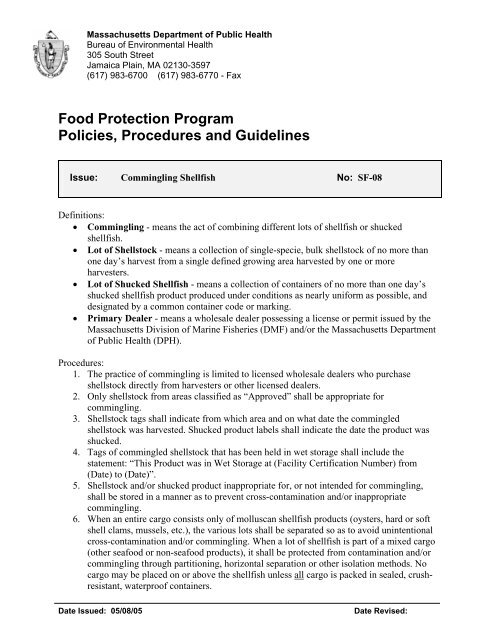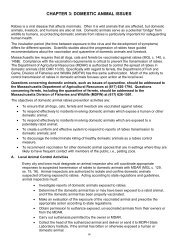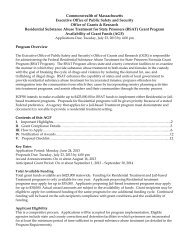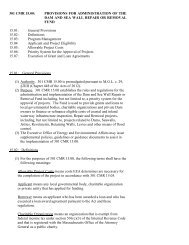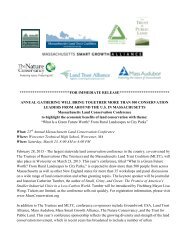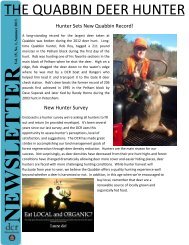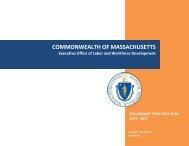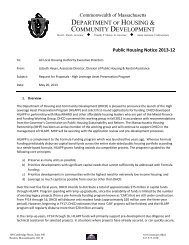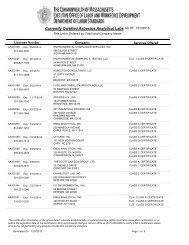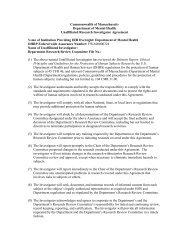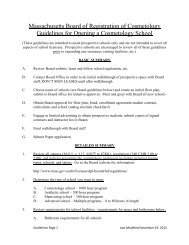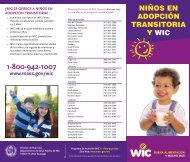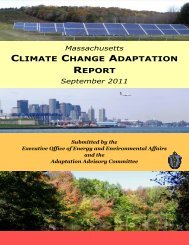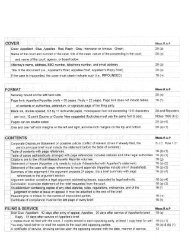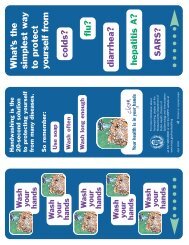Commingling Shellfish (PDF) - Mass.Gov
Commingling Shellfish (PDF) - Mass.Gov
Commingling Shellfish (PDF) - Mass.Gov
Create successful ePaper yourself
Turn your PDF publications into a flip-book with our unique Google optimized e-Paper software.
<strong>Mass</strong>achusetts Department of Public Health<br />
Bureau of Environmental Health<br />
305 South Street<br />
Jamaica Plain, MA 02130-3597<br />
(617) 983-6700 (617) 983-6770 - Fax<br />
Food Protection Program<br />
Policies, Procedures and Guidelines<br />
Issue: <strong>Commingling</strong> <strong>Shellfish</strong> No: SF-08<br />
Definitions:<br />
• <strong>Commingling</strong> - means the act of combining different lots of shellfish or shucked<br />
shellfish.<br />
• Lot of Shellstock - means a collection of single-specie, bulk shellstock of no more than<br />
one day’s harvest from a single defined growing area harvested by one or more<br />
harvesters.<br />
• Lot of Shucked <strong>Shellfish</strong> - means a collection of containers of no more than one day’s<br />
shucked shellfish product produced under conditions as nearly uniform as possible, and<br />
designated by a common container code or marking.<br />
• Primary Dealer - means a wholesale dealer possessing a license or permit issued by the<br />
<strong>Mass</strong>achusetts Division of Marine Fisheries (DMF) and/or the <strong>Mass</strong>achusetts Department<br />
of Public Health (DPH).<br />
Procedures:<br />
1. The practice of commingling is limited to licensed wholesale dealers who purchase<br />
shellstock directly from harvesters or other licensed dealers.<br />
2. Only shellstock from areas classified as “Approved” shall be appropriate for<br />
commingling.<br />
3. Shellstock tags shall indicate from which area and on what date the commingled<br />
shellstock was harvested. Shucked product labels shall indicate the date the product was<br />
shucked.<br />
4. Tags of commingled shellstock that has been held in wet storage shall include the<br />
statement: “This Product was in Wet Storage at (Facility Certification Number) from<br />
(Date) to (Date)”.<br />
5. Shellstock and/or shucked product inappropriate for, or not intended for commingling,<br />
shall be stored in a manner as to prevent cross-contamination and/or inappropriate<br />
commingling.<br />
6. When an entire cargo consists only of molluscan shellfish products (oysters, hard or soft<br />
shell clams, mussels, etc.), the various lots shall be separated so as to avoid unintentional<br />
cross-contamination and/or commingling. When a lot of shellfish is part of a mixed cargo<br />
(other seafood or non-seafood products), it shall be protected from contamination and/or<br />
commingling through partitioning, horizontal separation or other isolation methods. No<br />
cargo may be placed on or above the shellfish unless all cargo is packed in sealed, crushresistant,<br />
waterproof containers.<br />
Date Issued: 05/08/05 Date Revised:
7. All handling and recordkeeping practices shall ensure that any container of shellfish can<br />
be traced-back to a specific harvest date and harvest area.<br />
Operations:<br />
1. Repacking:<br />
• Shellstock or shucked product from different lots shall not be commingled during<br />
repacking.<br />
2. Wet Storage:<br />
• <strong>Commingling</strong> of bivalve mollusks with other species in wet storage may subject the<br />
bivalve mollusks to contamination from pathogenic organisms from the nonmolluscan<br />
animals. Fish, crabs, lobsters, and other marine species may be harvested<br />
from polluted areas and may have ingested pathogens or accumulated them on their<br />
body surfaces. Therefore, holding such animals in the same system with bivalve<br />
mollusks presents a risk of cross contamination.<br />
• <strong>Shellfish</strong> from harvest areas not classified as “Approved” shall not be commingled<br />
during wet storage. If multiple lots of shellfish from “Approved” areas are being held<br />
in wet storage at the same time, the identity of each individual harvest lot and its<br />
harvest area shall be maintained throughout the wet storage process.<br />
• Shellstock shall not be commingled with other species in the same tank. If multiple<br />
tank systems use a common water supply system for both the bivalve mollusks and<br />
the other species, the process water shall be disinfected prior to entering tanks<br />
containing the bivalve mollusks.<br />
3. Depuration:<br />
• Different harvest lots of shellfish shall not be commingled during washing, culling,<br />
processing, or packing. If more than one harvest lot of shellfish is being processed at<br />
the same time, the identity of each harvest lot shall be maintained throughout the<br />
depuration process and final packing. If shellfish in different tanks are at different<br />
stages of depuration, each tank shall be labeled to show when depuration began. Nonpurified<br />
shellfish may not be removed from a depuration plant except under direct<br />
supervision of a health inspector.<br />
• Different shellfish species shall not be processed in the same depuration unit unless<br />
credible scientific evidence demonstrates that the species are compatible.<br />
4. Shucking:<br />
• Shellstock from different lots must be kept separated. The commingling of shellstock<br />
from different harvest areas is prohibited, except where all shellstock has been<br />
harvested from areas classified as “Approved”. Shucked product may be commingled<br />
only if it is from two consecutive days processing. No more than a single containersworth<br />
of shucked product may be commingled. The labeling on the container shall<br />
read “CO” before the date, e.g., CO050197 or CO121. The areas commingled must be<br />
documented in the daily shucking log and in the sales records.<br />
Date Issued: 05/08/05 Date Revised:


